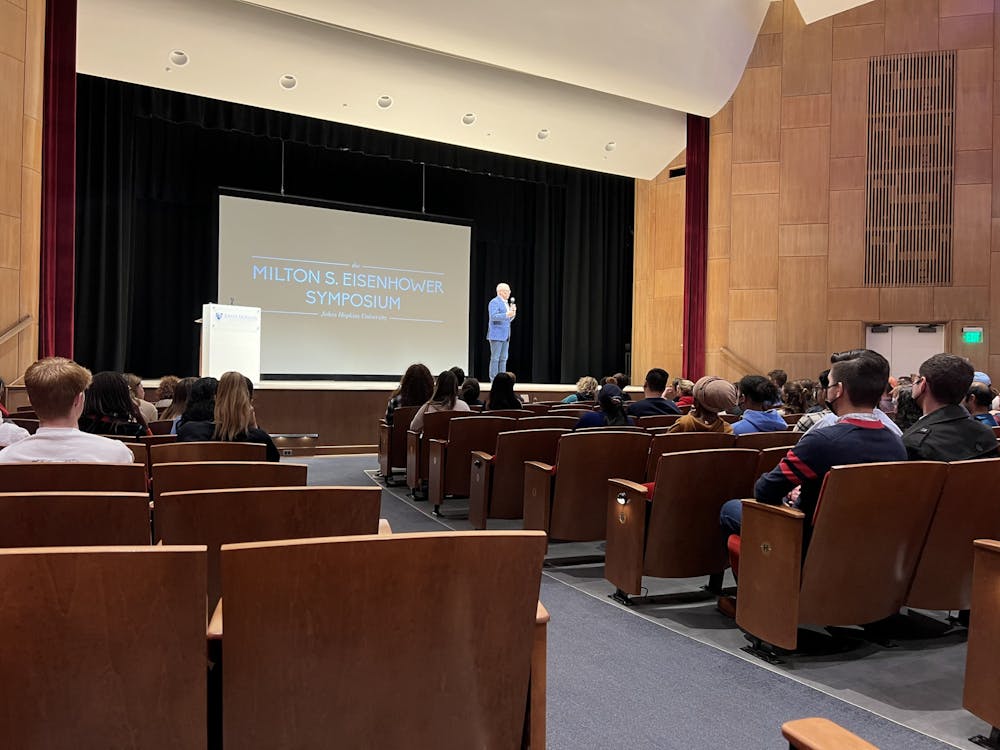The Milton S. Eisenhower (MSE) Symposium hosted the first speaker, Jim Obergefell, in the first event of the 2022 “The Road Ahead” series on Sept. 28. Obergefell was the lead plaintiff in the 2015 Supreme Court decision Obergefell v. Hodges, which legalized same-sex marriage in the United States. He spoke of his journey from an “accidental activist” to a “purposeful activist,” now publicly advocating for gay rights.
Obergefell opened his talk by detailing his discovery and acceptance of his identity. He met his partner, John Arthur, for the first time while still closeted to the world. When confronted with the question of his sexuality during a road trip with two classmates, Obergefell describes the moment when he first opened up about his identity to others.
“All of this is happening, my life is flashing in front of my eyes... It was my turn, and I surprised myself by answering gay,“ he said. “To anyone who's ever admitted that to another person, that feeling of relief, that feeling of a weight lifting off our shoulders was incredible.”
In June 2012, Arthur was diagnosed with amyotrophic lateral sclerosis (ALS), an incurable terminal illness that deteriorates the brain’s ability to relay messages to the person’s body. Nearly a year later in April 2013, Obergefell became Arthur’s full-time caregiver as he began home hospice care.
“This is the man I love. This is the person who's most important to me in my life. When you love someone, you take care of them,” he said.
On June 26, 2013, Obergefell and Arthur heard the news of the Supreme Court overturning the Defense of Marriage Act in United States v. Windsor. This overturned the federal act that defined marriage as solely between a man and woman, thus opening the door for the recognition of same-sex marriage.
After deciding to get married in Maryland, Obergefell worked on finding a means of getting Arthur there and back, and on July 11, 2013 Obergefell and Arthur got married.
“I got to take his hand, and we got to say those words that we wanted to say for so long... And it's not an exaggeration to say it was the happiest moment of our life together,” he said. “We felt better, we felt more complete. We just felt seen.”
Al Gerhardstein, a civil rights attorney in Cincinnati, reached out to Obergefell and Arthur about a hurdle in the recognition of same-sex marriages. Gerhardstein explained to the newlyweds how, upon Arthur’s death, the state of Ohio would not recognize Obergefell as Arthur’s surviving spouse on his death certificate. Gerhardstein asked Obergefell and Arthur if they wanted to do something about this issue, and they quickly agreed.
11 days after getting married, Obergefell was in the courtroom for the hearing of their case.
“I got to take that stand and look the judge right in the eye as I talked about John,” he said. “I talked about what he meant to me, what our marriage meant to both of us and what it meant for the state of Ohio to ignore us, to pretend we don't exist.
Obergefell expressed the importance of voting in all elections to ensure that the government and judicial system represents the values shared by the populace.
Junior Nessa Trombetta felt that there was a collective agreement on the inspiring and moving influence of Obergefell’s story in an interview with The News-Letter.
“To be in the presence of somebody who has created such a change, it’s a reminder of so much work to do,” Trombetta said. “I really appreciated it. It gives me hope that we still have a chance, even if things look bad right now.”
In an interview with The News-Letter, junior Hardy Williams related to Obergefell’s story on a personal level and reflected on its influence on the Hopkins community.
“I’m gay, and I remember when Obergefell happened. I’ve always wanted to hear his story, and I’m happy I did. His story was really powerful, and I thought it resonated with Hopkins,” Williams said.
In an interview with The News-Letter, junior Shreya Sriramineni, one of the programming chairs for the MSE Symposium, emphasized the careful planning and emphasis on diversity that goes into organizing the speaker events.
Sriramineni encourages all members of the Hopkins community to take the opportunity to listen to these Symposium speakers. The series is excited to welcome more speakers for the 2022–23 season.
“Everyone is very busy, especially in a STEM-dominated campus culture, but I think civic engagement is an important thing, and being engaged with the world is important to carve out time for,“ she said. “We also invite a wide variety of speakers, so if you just want a piece of what you see in the news, you should attend an MSE event!”





